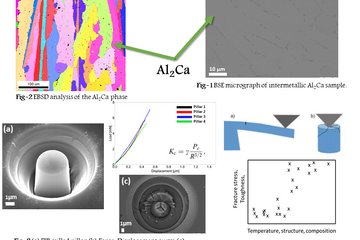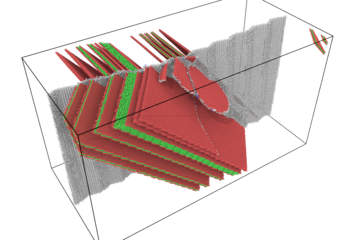All genres
1481.
Poster
Towards an ab-initio based understanding of H-embrittlement in austenitic steels. Scientific Advisory Board Meeting 2009, MPIE, Düsseldorf, Germany (2009)
1482.
Poster
First Principle Study on the Thermodynamics of Hydrogen in Iron and Steels. MRS Fall Meeting 2009 , Boston, MA, USA (2009)
1483.
Poster
Hierarchical modeling of the mechanical properties of lobster cuticle from nano‐ up to macroscale: The influence of the mineral content and the microstructure. 4th International Conference on Multiscale Materials Modeling, Tallahassee, FL, USA (2008)
1484.
Poster
Importance of magnetism for the thermodynamics of bcc iron: An ab initio study. Summer School 'Nanomagnetism and Spintronics', Prague, Czech Republic (2008)
1485.
Poster
A multiscale approach to hydrogen embrittlement. Recent developments in interatomic potentials, Oxford, UK (2008)
1486.
Poster
First principles calculation of stacking fault energies of FeMn-alloys. International Workshop on Ab initio Description of Iron and Steel (ADIS2008), Ringberg Castle, Germany (2008)
1487.
Poster
First principles study of the alpha-iron stability limits. Ab initio Description of Iron and Steel: Magnetism and Phase diagrams (ADIS 2008), Ringberg Castle, Tegernsee, Germany (2008)
1488.
Poster
Towards an ab initio description of corrosion. International Workshop on Ab initio Description of Iron and Steel (ADIS2008), Ringberg Castle, Germany (2008)
1489.
Poster
First Principles Study of Fe–C interstitial solid solutions. International Workshop on Ab initio Description of Iron and Steel (ADIS2008), Ringberg Castle, Germany (2008)
1490.
Poster
Phase transformations of Ni2MnGa shape memory alloy from first principles. International Workshop on Ab initio Description of Iron and Steel (ADIS2008), Ringberg Castle, Germany (2008)
1491.
Poster
Ab initio investigation of temperature dependent effects in magnetic shape memory alloys. Evaluation of the SPP 1239 program, Dresden, Germany (2008)
1492.
Poster
Error-propagation in multi-scale approaches to the elasticity of polycrystals. Spring meeting of the German Physical Society (DPG), Berlin, Germany (2008)
1493.
Poster
First principles determination of phase transitions: The (pre)martensitic transition in Ni2MnGa. UCSB-MPG Workshop on Inorganic Materials for Energy Conversion, Storage and Conservation, UCLA Lake Arrowhead Conference Center, CA, USA (2008)
1494.
Poster
First principles analysis of Hydrogen in Manganese-rich austentitic steels. Spring meeting of the German Physical Society (DPG), Berlin, Germany (2008)
1495.
Poster
First principles study of Hydrogen in Mn-rich austenitic steels. Spring meeting of the German Physical Society (DPG), Berlin, Germany (2008)
1496.
Poster
Importance of magnetism for the thermal expansion of transition metals: An ab initio study. Spring meeting of the German Physical Society (DPG), Berlin, Germany (2008)
1497.
Poster
Novel multi-descriptive approach to crystal plasticity of textured beta-Ti alloys. Deutschen Physikalischen Gesellschaft (DPG) Annual Meeting 2008, Berlin, Germany (2008)
1498.
Poster
Ab-initio study of compositional anti-correlation of In and N in InGaAsN alloys. The 7th International Conference of Nitride Semiconductors (ICNS-7), Las Vegas, NV, USA (2007)
1499.
Poster
Bottom up design of novel titanium-based biomaterials through the combination of ab-initio simulations and experimental methods. Euromat 2007, Nürnberg, Germany (2007)
1500.
Poster
First-Principles Study of the Carbon-Carbon Interaction in Iron. Euromat 2007, Nürnberg, Germany (2007)











